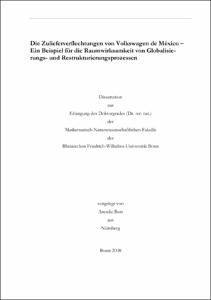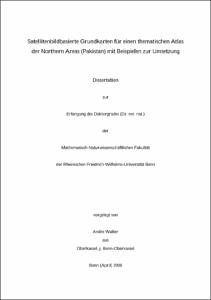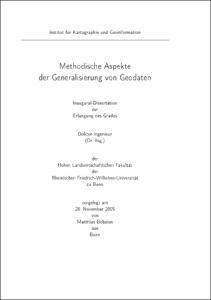Dsouza, Alishiba Florian: Knowledge Graph Creation for Volunteered Geographic Information. - Bonn, 2024. - Dissertation, Rheinische Friedrich-Wilhelms-Universität Bonn.
Online-Ausgabe in bonndoc: https://nbn-resolving.org/urn:nbn:de:hbz:5-77450
Online-Ausgabe in bonndoc: https://nbn-resolving.org/urn:nbn:de:hbz:5-77450
@phdthesis{handle:20.500.11811/11946,
urn: https://nbn-resolving.org/urn:nbn:de:hbz:5-77450,
author = {{Alishiba Florian Dsouza}},
title = {Knowledge Graph Creation for Volunteered Geographic Information},
school = {Rheinische Friedrich-Wilhelms-Universität Bonn},
year = 2024,
month = aug,
note = {Community-created geographic data sources, such as OpenStreetMap, are semi-structured sources of geographic information. These sources rely on voluntary contributions from individuals worldwide, resulting in huge amounts of geographic data. However, this volunteer nature poses challenges due to the varying interests and expertise of the volunteers. The entity and schema representations within OpenStreetMap are sparse and heterogeneous, making it challenging to manage and access the data for downstream applications. Meanwhile, semantic data sources such as knowledge graphs offer more structured data, following ontologies that provide uniform representations and semantic relationships. Aligning community-generated geographical resources with knowledge graphs allows us to enrich the former with semantic data and provide the knowledge graphs with precise geographical information.
However, integrating volunteered geographic information sources and knowledge graphs is difficult due to challenges such as less annotated data, poor data quality, and representational differences between entities and schema. To alleviate these obstacles, in this thesis, we propose solutions for the alignment of entities and schemas and creating a comprehensive geographic knowledge graph. Initially, we present NCA, a neural model to align OpenStreetMap schema elements, commonly referred to as tags, with knowledge graph classes by utilizing a novel shared latent space and contrastive learning. Then, by utilizing the knowledge gained from NCA, we present IGEA, an iterative approach to align schema elements and entities between OSM and knowledge graphs. IGEA leverages a cross-attention mechanism for the alignment. By utilizing entity descriptions from multiple sources, IGEA finds better alignments than the state-of-the-art approaches. Finally, we present WorldKG, a novel geographic knowledge graph containing OpenStreetMap data in semantic format. WorldKG knowledge graph adheres to the novel WorldKG ontology created by representing the tags of OSM in superclass subclass relations.
By addressing the challenges of data integration and implementing a structured ontology, WorldKG serves as a valuable resource for downstream applications, providing a platform for accessing and leveraging geographic data in a structured and comprehensive manner. In addition to the immediate benefits for downstream applications, the methods and knowledge graph developed in this thesis will benefit further developments in the domain of geographic information on the web.},
url = {https://hdl.handle.net/20.500.11811/11946}
}
urn: https://nbn-resolving.org/urn:nbn:de:hbz:5-77450,
author = {{Alishiba Florian Dsouza}},
title = {Knowledge Graph Creation for Volunteered Geographic Information},
school = {Rheinische Friedrich-Wilhelms-Universität Bonn},
year = 2024,
month = aug,
note = {Community-created geographic data sources, such as OpenStreetMap, are semi-structured sources of geographic information. These sources rely on voluntary contributions from individuals worldwide, resulting in huge amounts of geographic data. However, this volunteer nature poses challenges due to the varying interests and expertise of the volunteers. The entity and schema representations within OpenStreetMap are sparse and heterogeneous, making it challenging to manage and access the data for downstream applications. Meanwhile, semantic data sources such as knowledge graphs offer more structured data, following ontologies that provide uniform representations and semantic relationships. Aligning community-generated geographical resources with knowledge graphs allows us to enrich the former with semantic data and provide the knowledge graphs with precise geographical information.
However, integrating volunteered geographic information sources and knowledge graphs is difficult due to challenges such as less annotated data, poor data quality, and representational differences between entities and schema. To alleviate these obstacles, in this thesis, we propose solutions for the alignment of entities and schemas and creating a comprehensive geographic knowledge graph. Initially, we present NCA, a neural model to align OpenStreetMap schema elements, commonly referred to as tags, with knowledge graph classes by utilizing a novel shared latent space and contrastive learning. Then, by utilizing the knowledge gained from NCA, we present IGEA, an iterative approach to align schema elements and entities between OSM and knowledge graphs. IGEA leverages a cross-attention mechanism for the alignment. By utilizing entity descriptions from multiple sources, IGEA finds better alignments than the state-of-the-art approaches. Finally, we present WorldKG, a novel geographic knowledge graph containing OpenStreetMap data in semantic format. WorldKG knowledge graph adheres to the novel WorldKG ontology created by representing the tags of OSM in superclass subclass relations.
By addressing the challenges of data integration and implementing a structured ontology, WorldKG serves as a valuable resource for downstream applications, providing a platform for accessing and leveraging geographic data in a structured and comprehensive manner. In addition to the immediate benefits for downstream applications, the methods and knowledge graph developed in this thesis will benefit further developments in the domain of geographic information on the web.},
url = {https://hdl.handle.net/20.500.11811/11946}
}









